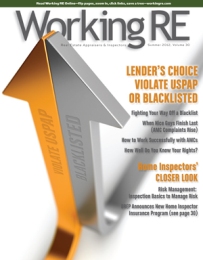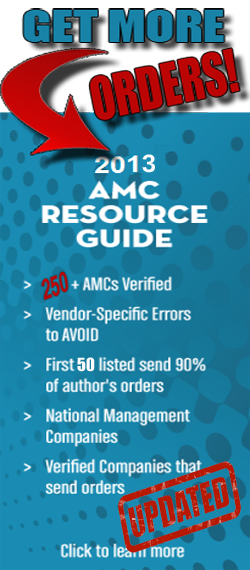
|
Published by OREP, E&O Insurance Experts | August 29, 2012 | Vol. 259 |

|
>
Am I a Working RE Paid Subscriber?
> Blogs
> Leave Comments Below
|
The following Q&A comes from attendees to the webinar
The Top 5 Questions Asked of an Appraiser and How to Answer
presented by Richard Hagar, SRA.
Editor’s Note:
The following Q&A comes from attendees to the webinar
The Top 5 Questions Asked of an Appraiser and How to Answer
presented by Richard Hagar, SRA.
Click
here to learn more about the webinar.
Can you Disclose Fees to Public? (And other questions answered.)
Question:
First of all (Richard),
thank you for your valuable input.
Your knowledge is a great help to all appraisers…I hope they are paying
attention!
What about the laws regarding whether I can disclose the fee I charge for an
appraisal to a homeowner (or Realtor), when an AMC is being used by the lender
to order and arrange the appraisal? I had a homeowner ask me what I charged the
lender/AMC for the appraisal and I am not certain that I can discuss that issue
with them, without the lender/AMC’s permission. Of course they (the lender/AMC)
would rather that I didn't. I need
clarification whether I can discuss with a homeowner or a Realtor.
– Steven
L. Smith, Appraisals LTD.
Question: Hi Richard. I took part in
your webinar last week on the Top 5
Questions. Just after, I got a request to review additional comps from an
AMC. I told them that it was against TILA (Truth in Lending Act) &
Dodd/Frank. They sent me back:
EXCEPTIONS.—The requirements of subsection (b) shall not be construed as
prohibiting a mortgage lender, mortgage broker, mortgage banker, real estate
broker, appraisal management company, employee of an appraisal management
company, consumer, or any other person with an interest in a real estate
transaction from asking an appraiser to undertake 1 or more of the following:
‘‘(1) Consider additional, appropriate property information, including the
consideration of additional comparable properties to make or support an
appraisal.
‘‘(2) Provide further detail, substantiation, or explanation
‘‘(3) Correct errors in the appraisal report.
How do appraisers defend against this? Is there a place in the law that
clearly states that appraisers are not to be influenced? I really need
your help on this because I have already tried to fight the good fight after
participating in your webinar but when this quote was pointed out to me, I was
stumped. It appears that the law has a huge "loop-hole" by which the AMCs
can still try and influence value. Any help you can offer will be greatly
appreciated. -
J. Bentley Rainwater, CREA
One way to measure “influence” is- did the “comparables” they send all have
sales prices higher than your appraised value? If they are, then it appears to
be an attempt at pushing the appraiser to a higher value (influence). If, and
this is a big if, what they sent are better comparables, they would likely have
prices below and above your value point. Since they ALL have prices above your
value and - let me guess - likely not “comparable” (shock), it appears to
be an attempt at influencing the appraisal outcome – an illegal act. Comparables
should bracket the subject, some higher in price, some lower, bigger and
smaller, younger and older (etc.). If this is what they sent, then maybe, just
maybe, they are trying to improve the quality of the appraisal.
Likely, it is someone with a financial interest in the
property - hmmmmm? People are allowed to interact with the appraiser to try to
help by sending information. However, it’s a razor’s edge between help and
influence. Every lender and AMC is required to have
written policies and
procedures that outline what is allowed and what is “influence.” My suggestion
is to have the lender/AMC send you a copy of their written policies and
procedures regarding the additional information. And if they don’t have
them, you have the option of letting their federal regulator know about the
failure.
Nicer Solution: You
can give them a simple reply: “I did consider these sales in the original
appraisal process. None of them were considered superior to the comparables used
in the report.” Place it on your letterhead, PDF and send it back.
Now if you want to take it a step further: Analyze their sales, briefly state why they are not comparable and send a written response to the Chief Compliance Officer of the bank and tell that person: “This appears to be an attempt at influencing the outcome of the appraisal.” In brief, provide the who, what, when and where. That will get their attention and likely stop the problem in the future.
Here is a general tip: If you think something is wrong, document everything and
shine light on it. Then sit back and see who scatters. These are the kinds of
solutions we are providing to both sides in our webinars- appraisers and
AMCs/lenders. This is why it is so important that every appraiser and AMC/lender
who cares about staying in business attend these webinars. Even
one mistake can be a game ender. You need
to learn what to do to remain insulated and protected and what not to do, to
avoid trouble. You need to do some things and there are some things you need to
avoid doing. This environment is like a mine field. These
webinars (recorded or live) are vital.– Richard Hagar,
SRA
Question asked at
Top 5 Questions
webinar:
Is the pressure placed on appraiser John Dingeman considered
unlawful “coercion” and therefore prohibited by any state or federal law? (John
Dingeman is the appraiser featured in the story
Chase Challenges USPAP who had a complaint
filed against him and is blacklisted by a lender because he would not violate
the confidentiality section in USPAP to discuss an appraisal with the lender-
who is not the original client.)
Answer: First of all, I am not
an attorney and I do not give legal advice. The ultimate decision on whether Mr.
Dingeman is being coerced or not, would best be answered in a court of law.
However, I will give you my opinion and provide a few definitions.
Short answer: To me, what has happened to Mr. Dingeman, and hundreds of other appraisers, sounds like coercion and a bully trying to intimidate an appraiser.
Long answer: This exact topic was covered in my webinar: How to Limit Liability, Maintain Independence, and Fight Influence. If appraisers want to learn how to stop bullies, they should take this class (offered in webinar form, recorded or live, or for CE credit if we’re in your area).
Webster’s Definition of Coercion:
Coercion (Noun) the practice of forcing another party to behave in an
involuntary manner (whether through action or inaction) by use of threats,
intimidation, trickery, pressure or force.
– Such actions are used as leverage, to force the victim to act in the desired
way. Coercion may involve the actual infliction of physical pain/injury or
psychological harm in order to enhance the credibility of a threat.
–
The threat of further harm may lead to the cooperation or obedience of the
person being coerced.
This sort of pressure, coercion and intimidation is not
unique to Mr. Dingeman or the lender he is dealing with. On a daily basis I
experience or hear examples of lenders and AMCs deceiving and intimidating
appraisers on a wide variety of issues, the “client issue” being just one.
Appraisers are certified by the states and at risk of losing their certification
and paying huge, and I mean HUGE, fines if they do wrong. The people making
these stupid requests have no training, no license to lose and they don’t face
the same pain appraisers do if they are wrong. Appraisers are the
certified professionals and
the clerks at the other end of the phone are not. The clerks at the other
end, they just want what they want and don’t seem to care about regulations or
the law.
The solution: Learn the laws, take my webinars, be businesslike, help your
client understand what they are doing is wrong and fight back. – Richard Hagar, SRA.
HTML Comment Box is loading comments...
ATTENTION: You are receiving WRE Online News because you opted in at WorkingRE.com or purchased E&O insurance from OREP. WRE Online News Edition provides news-oriented content twice a month. The content for WRE Special Offer Editions is provided by paid sponsors. If you no longer wish to receive these emails from Working RE, please use the link found at the bottom of this newsletter to be removed from our mailing list.



